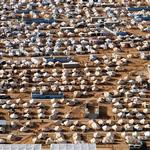R.I.P., Europe
Lampedusa, 9 October 2019.
A simple, moving ceremony for the people who died at sea on 7 October, took place today in the small island of Lampedusa. Only a few days ago Lampedusa commemorated the anniversary of the tragedy that occurred on 3 October 2013, when over 360 persons lost their lives in the Mediterranean waters when the fishing boat transporting around 500 people sunk a few miles from the coast. Thousands of people have died in the Mediterranean Sea in the past few years in an attempt to reach Europe. What happened two days ago was only the most recent episode in this human-made, ongoing catastrophe.
According to the latest figures, at least 30 people, including an infant, lost their lives on 7 October. Many are still missing. All the 13 bodies that were initially pulled out of the sea were women. The survivors have only identified four of them.
The boat raised anchor in Sfax. A few miles from the coast of Lampedusa it got into trouble. The engine stopped working, and water started flooding into the bottom of the boat where a group of Sub-Saharan women were sitting with their children. The boat capsized when the coast guard boat approached. All the Sub-Saharans and Tunisians people onboard ended up in the water. Two Tunisian guys told me that they had managed to get a pregnant woman onboard the coast guard vessel moments before the boat capsized. In the dark water, they said, there was chaos. “People who could not swim tried to grab us. They can pull you down. They make you drown,” one of them said. “The only thing I could do was to swim to the vessel.”
A sense of loss pervaded today’s ceremony. Not only for the persons who died, but also for the idea of Europe, itself drowned with those who believed in it.
The anthropologist Laura Nader once asked: “Is there anything more fundamental to what makes humans human than ideas of right or wrong?” This is a good question. Every discussion about migration, borders and refugees seems to be dominated by pragmatic approaches: Is it convenient, in economic terms, for Europe to welcome high numbers of migrants? Are they really “high numbers”? Are protectionist national regulations in conflict with international law? Who is legally responsible for boats filled with migrants in need of help in the Mediterranean? These are pertinent questions. Yet, they don’t address the core issue, which is rather a matter of right and wrong. I struggle with the thought of how anyone with a basic moral attitude towards humanity can think that it is right that some people have passports and are free to move around while others don’t even have a passport (or have a passport that “doesn’t count” in international mobility) and are denied this basic right.
Open borders is the only possible answer to the current dismantling of the European project and, more profoundly, of ideals of solidarity, fraternity and equality. We need open borders simply because it is the right thing to do. It should not be contingent on an analysis of pros and cons, or on considerations of an economic, legal and political nature. The arrogant and violent language of a transnational class of political figures, the tyranny of financial capitalism, the disintegration of socialist ideologies, and the rising of a vulnerable underclass at the European level have transformed a matter of right and wrong into a battle among the poor. “Migrants steal our jobs”, “They receive more benefits than us”, “Italians first” (tragically reproducing Donald Trump’s deplorable motto “America first”). These discourses signal the victory of dominant classes over the subalterns. Local populations in hotspot locations like Lampedusa have shown great solidarity, often against the will of national governments. But anti-migrant sentiments seem to prevail all over Europe at this point in history. Qualitative studies have extensively demonstrated that irregular migration is a huge business for those in power, and for criminal organizations.
Whoever reiterates ideologies of closed borders that hinders mobility, becomes complicit in a business where profit is made from human suffering and human exploitation.
It is always illuminating to try to explain complex things in simple ways. Now, try to explain the politics of borders to a child.
How can we explain to a child that some people, who are in dire need, cannot cross a border to enjoy refuge and care in search for a better life?
Unscrupolous pragmatists would say that you do that by explaining to the child that we have to protect “us” first, that we have to secure jobs for "ourselves first", and that this is “our land”. I have deep concerns about who that child will be tomorrow.
Field note by Antonio De Lauri
Project

